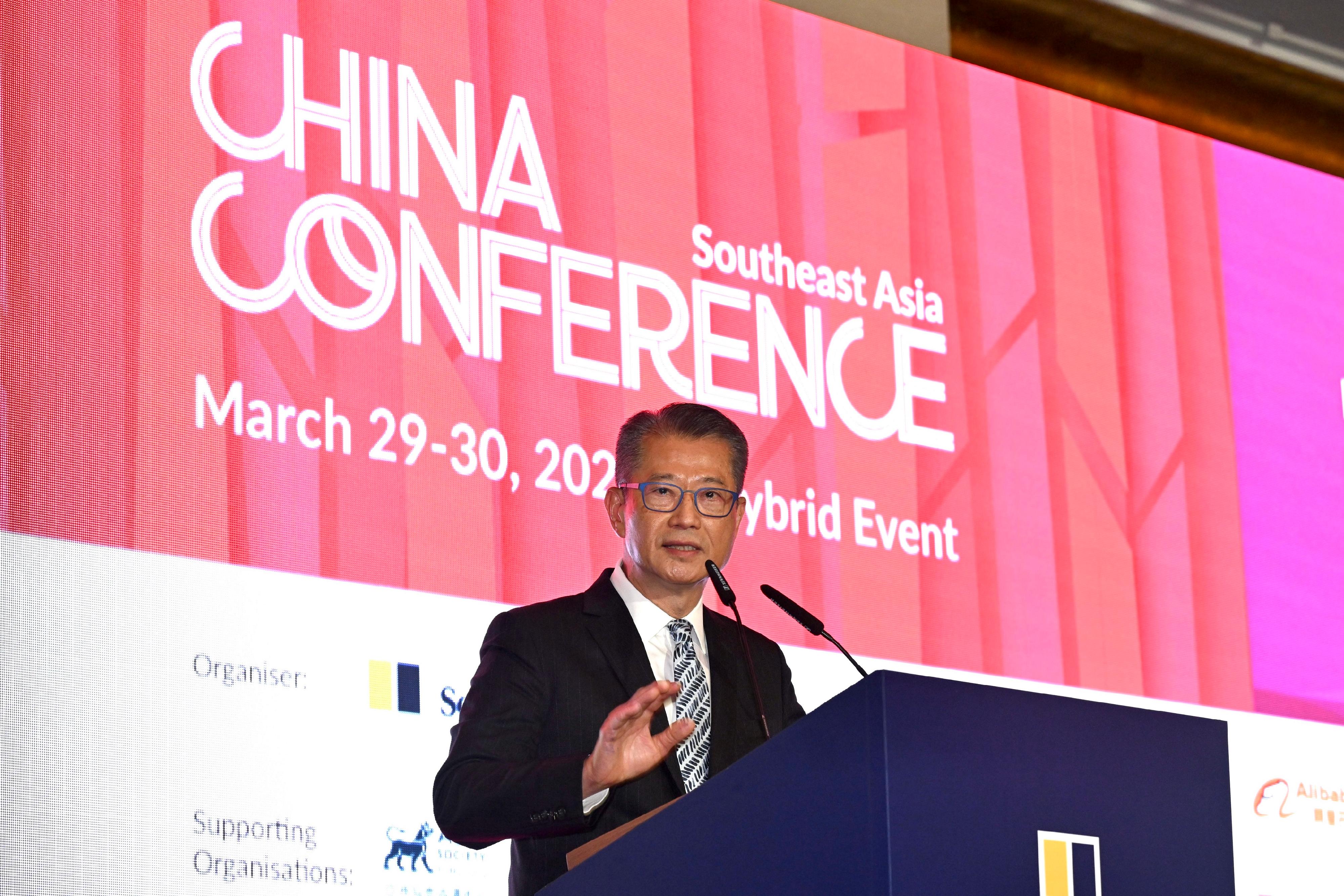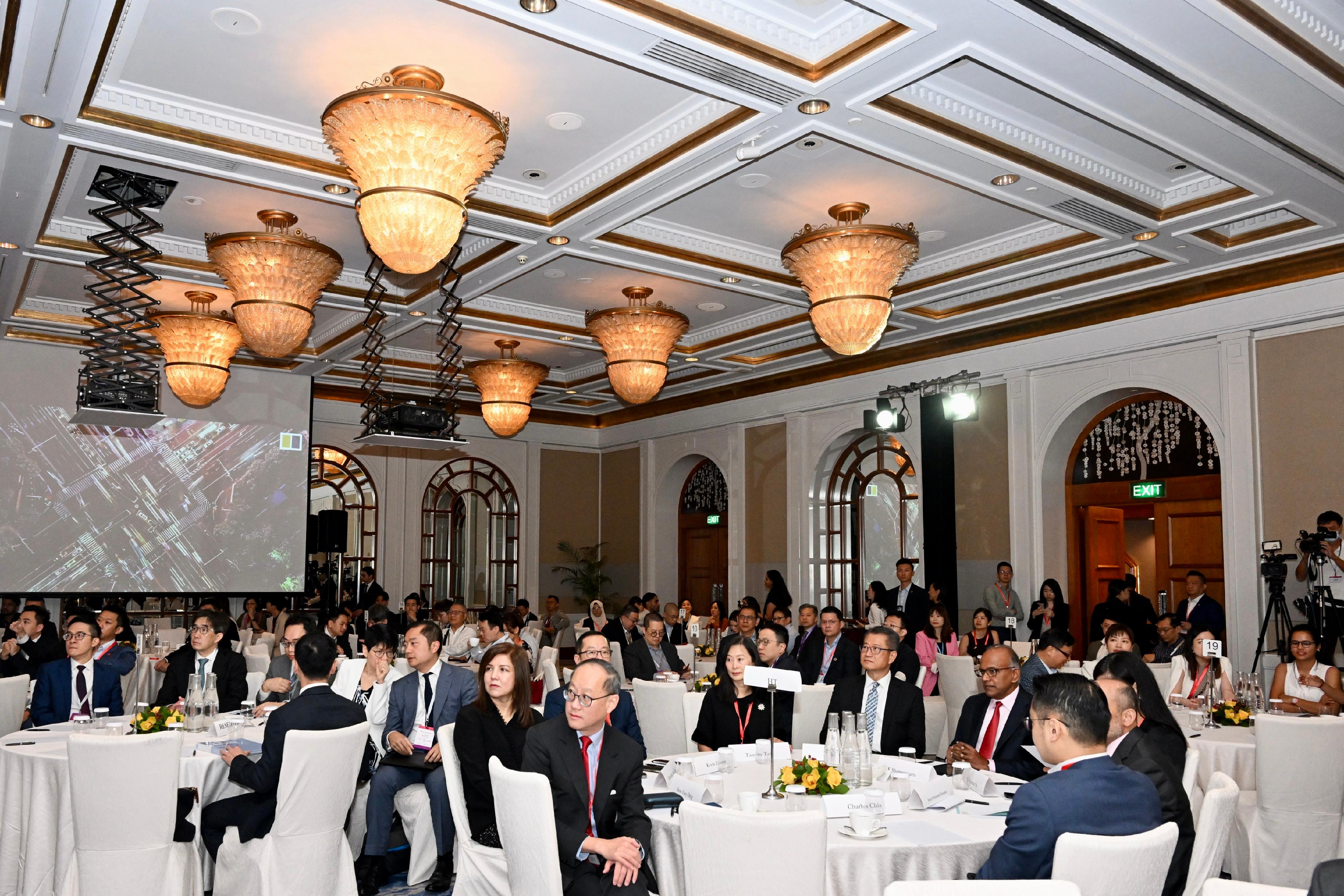Speech by FS at China Conference: Southeast Asia 2023 (English only) (with photos)
**********************************************************************************
Catherine (Chief Executive Officer of South China Morning Most (SCMP), Ms Catherine So), The Honourable K Shanmugam (Minister for Home Affairs and Minister for Law of the Republic of Singapore), Datuk Dr Azfar Mohamad Mustafar (High Commissioner of Malaysia to Singapore), Ms Rush (High Commissioner of New Zealand to Singapore, Ms Gabrielle Rush), distinguished guests, ladies and gentlemen,
Good morning, and hello from Hong Kong! I'm delighted to be here in Singapore, all the more so as Hong Kong has now fully returned to normalcy. Once again, Hong Kong embraces the world and connects with our friends and partners in the ASEAN (Association of Southeast Asian Nations) and the Asia Pacific.
I am glad in particular to participate in SCMP's fifth edition of China Conference: Southeast Asia 2023. I guess it is named so because that's where the future lies. China and ASEAN. Being the world's most dynamic, fast growing and innovative economies, together we are playing an increasingly instrumental role in reshaping the global economy.
The Future is Asian
It is not an understatement. Along four decades of reform and opening up, China's economy maintained an impressive growth rate of almost 10 per cent per annum, having become the second-largest economy in the world. Prosperity aside, our country's economic progress and people-centred development philosophy have contributed to poverty alleviation of the largest scale in human history.
ASEAN is booming too. Economists are expecting that the 10 countries of ASEAN are on the way to become the fourth largest economy in the world by 2030.China and ASEAN have become each other's largest trading partner, with the Regional Comprehensive Economic Partnership (RCEP) Agreement and the ASEAN-China Free Trade Area working to further underpin and expand mutual co-operation.
Despite the rather gloomy global economic outlook elsewhere, Asia has remained a global economic powerhouse. This is so true in the midst of high geopolitical tensions, and the financial turbulence in the United States (US) and Europe recently. Countries like those in the Gulf region are actively seeking to diversify investments to this part of the world.
In simple terms, The Future is Asian.
The future of China and ASEAN together are just boundless. As you know, in the recent "two sessions" meetings in Beijing, China is steadfastly marching towards high-quality development, which is characterised by innovation and technology, green transformation and the private sector economy. This vision has many similarities with that of ASEAN, especially in areas of digital economy and green transition.
Take green transition for example. China has set its "3060" targets - that is, to halve carbon emissions by 2030 and reach carbon neutrality by 2060. Malaysia and Singapore are both committed to reaching carbon neutrality by 2050.
We share the same vision of our country, and we are keen to contribute to the development of our nation and Asia, in particular ASEAN countries. In my recent Budget delivered in February, I have laid out the development directions and strategy of Hong Kong in the coming years. In the short term, our focus is reinforcing and accelerating economic recovery. In the medium term, driving the economy towards high-quality development. As you all know, Hong Kong is an international financial centre, combining the free market economy advantages and the market size advantage of China. We maintain the common law system and internationally recognised regulatory regimes. We have a deep pool of capital, talent and expertise. We serve as a high value-added services platform, with free flow of capital, funds, talent and information.
The Central Government of China always lends full support to Hong Kong. We will continue to press ahead with the "eight centres" development directions that our country has set out for us, taking into consideration our strengths and unique functions. These centres are: international financial, trade, shipping and innovation and technology centres; international aviation hub as well as regional legal and dispute resolution services centre, regional intellectual property trading centre, and East-meets-West centre for international cultural exchange.
In these pursuits, we will also leverage our synergies with our sister cities in the Guangdong-Hong Kong-Macao Greater Bay Area (GBA) so that together, we will rise as the most competitive economic powerhouse, combining the strengths of the New York Bay Area and the San Francisco Bay Area.
But apart from these, I have outlined three areas that we will push forward to power our high-quality development. They include the digital economy, Web3 as well as the international centre for GreenTech and Green Finance.
And in relation to the topics of today's panel discussion, allow me to highlight two specific areas.
Catalysing green transformation
First, supporting the region's green transformation. Estimates have suggested that in Asia alone, the green funding needs in the coming three decades would reach US$66 trillion. Hong Kong is already Asia's number one in the issuance of green and sustainable debts. Last year alone, the amount raised reached around US$80 billion. These are multi-currency issuances involving US dollars, Euro, Renminbi and Hong Kong dollars, with various tenures of up to 30 years. Some of them, at the time of issuance, were the first of such bonds issued by a government in Asia. We have set benchmarks for the markets. In February, we also issued the first ever tokenised government green bonds.
But our aspiration is much higher and bigger. We are determined to position ourselves as the centre for GreenTech and GreenFi (Green Finance). Hong Kong is home to a burgeoning cluster of GreenTech companies and start-ups. Some of their innovative solutions in carbon sequestration, environmental engineering, energy reduction, etc, are already finding success in the markets of the ASEAN, Middle East and other parts of the world. By synergising with the innovation competence and market size in the GBA for the application of these solutions, we will rise as the GreenTech centre.
Our vision is to bring together the GreenFi and GreenTech sectors so that they can form a symbiotic relationship, which will firmly support cycles of R&D (research and development), product commercialisation and mass production as well as a complete and vibrant industry chain.
To achieve this, we are working on five areas.
First, building a green technology ecosystem with top-notch enterprises and start-ups setting up in Hong Kong. And encouraging cross-sector collaboration to commercialise R&D outcomes and boost demand for green technology.
Second, continuing to innovate in green financing, helping green projects and companies get the capital they need faster and easier.
Third, promoting green certification, green standard setting and converging the Mainland and international green standards.
Fourth, nurturing talents, through training locals as well as attracting talents from all over the world.
Fifth, enhancing collaboration with the GBA and ASEAN countries.
To encourage international co-operation, as well as knowledge and experience sharing in this respect, we will be organising an International Green Tech Week in Hong Kong later this year, bringing enterprises and talents together to create the needed dialogue and discussion; and create opportunities for business and collaboration. You are most welcome to join us.
Innovating in fintech
The second area is fintech and financial innovation. Fintech is driving a lot of change to the way finance is conducted, making leapfrogging development possible and promoting financial inclusion. It is indeed heartening to see that fintech enables expanded access to financial services by those who would have otherwise been left out by traditional financial services.
Hong Kong is now home to over 800 fintech companies and start-ups, offering a wide range of innovative services such as mobile payments, cross-border transfers, intelligent financial consultancy, wealth management, virtual asset trading, and blockchain. We were the pioneers in issuing virtual bank and virtual insurance company licences. Currently, we have eight virtual banks and four virtual insurance companies.
We are proud that some of them have already been expanding their markets to the ASEAN economies. Consider Mox which is now providing service in Singapore, or WeLab in Indonesia. They originate from Hong Kong. Hong Kong is very keen to leverage on our experience and strengthen collaboration with our ASEAN partners.
Speaking of cross-border fintech collaboration, I am pleased to report that we are working with Thailand to explore the use of Hong Kong's Faster Payment System and Thailand's PromptPay by visitors from the two places for local payment, providing them with another safe, fast and effective payment option.
On digital currency, Hong Kong is also collaborating with the Mainland on the use of digital Renminbi in cross-boundary payments. On Central Bank Digital Currency (CBDC), we are working with a number of central banks on a project called the mBridge. It is among the first multi-central bank digital currency projects to support real-time, peer-to-peer, cross-border payments and foreign exchange transactions using CBDCs.
Web3 is of course an important arena where financial innovation can harness enormous opportunities based on blockchain technology. It provides a decentralised, secure, transparent and low-cost environment for innovation, including financial innovation.
We actively embrace Web3. In respect of virtual assets, we issued a policy statement on virtual assets in October last year, signifying our determination to foster sustainable and responsible development of the sector.
To realise that goal, we are putting in place a regulatory framework that facilitates innovation, while providing the necessary guardrails to ensure financial stability and investor protection.
So far, we are much encouraged by the remarkable response from players from around the world and have designated our Cyberport as the Web3 hub.
Ladies and gentlemen, I hope my foregoing updates on the work of Hong Kong are of interest to you. Hong Kong could play a unique role in contributing to the promising future of the Asian region together. We stand ready to share our knowledge, expertise and experience. We are delighted to collaborate with our partners from ASEAN, with our platform open and available to you all.
This Conference presents a wealth of opportunities for building partnerships and co-operation among individuals and companies, as well as at the economy and regional levels. For that, for giving me this welcome opportunity to speak to you today, my heartfelt thanks to the organiser, the South China Morning Post.
I wish you all a rewarding conference and the best of business and health in the year to come.
Thank you.
Ends/Wednesday, March 29, 2023
Issued at HKT 15:45
Issued at HKT 15:45
NNNN




